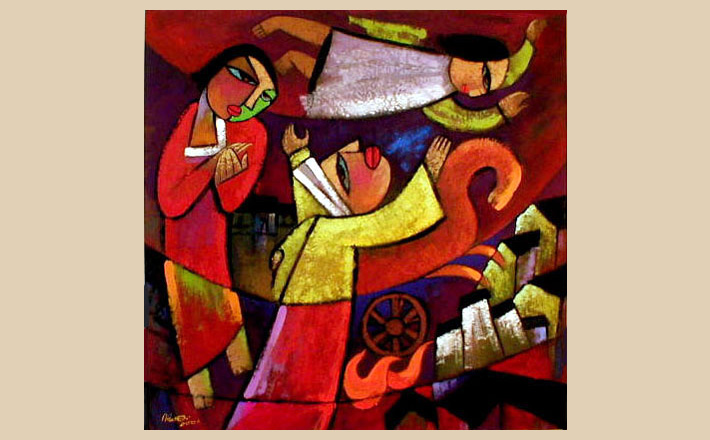Commentary on Galatians 5:1, 13-25
After his awkward, self-identified allegory of Hagar and Sarah (Galatians 4:22-31) in which freedom was connected with the idea of being an heir (4:30-31) and both freedom and heir connected with being the child promised to Abraham and Sarah, Paul seems to draw breath only to issue his ringing call in a resounding repetition of words in 5:1. In the word order of the Greek text you would hear this: “For freedom us Christ has freed.”
The sentence is enveloped in freedom language and we are with Christ inside that envelope. Freedom surrounds us and will continue to shape our lives. Our reading moves directly from that declaration and clarion call (“stand fast and do not submit again to the yoke of slavery) to the words of freedom in verse 13.
Again Paul makes the strongest possible emphasis on the “you” plural address. Again he frames the sentence with words describing the addressees: “You all,” “brothers,” “You all have been chosen for freedom.” He repeats the confident assertion of 5:1 by making personal and direct and clear, that “you all” have been chosen for freedom indeed, but Paul moves on very quickly to define the freedom.
It is not a wild, abstract freedom from restraint. Paul’s freedom does not create the culture we have become — at least not in his mind or on purpose. Paul proclaims the freedom with the passive voice of having been chosen by an implied agent, God. To be chosen by God for freedom, to have been freed by Christ is to have been freed from the dire results of life lived apart from God. It is also a call into freedom that in some ways mirrors God’s own, that is a freedom dedicated to serving others in love.
In the profundity of 5:13, Paul shows us both God and ourselves, free precisely for the purpose of service to others through love. This is to be a short essay on this passage from Galatians. Yet each of those words — free, serve, others, love — deserves its own deep exploration. I leave it to you: a sermon series on a verse? Perhaps it would refresh us all. For today, however, we need to keep going because Paul explores these ideas in the following verses.
We are freed to participate in a law, an instruction from God that is entirely contained in the great command from Leviticus 19:18 (LXX): You shall love your neighbor as yourself. That would be a “you singular”, each of you, each one of you. Love your particular neighbor. There is the law in this sense: it is God’s way of being and God’s instruction or even description for a human way of being. Now, Paul believed, such a way was open to all baptized in Christ Jesus.
I honestly run out of English words here. “Law” has such a strong sound echoing with long histories of Christian and Jewish debate and with histories of law codes, increasingly debated and enforced by bureaucratic means. Yet law as nomos does not have all those implications. Rather it speaks of God’s sharing with us what human being is to be, was created to be and what kinds of consequences there are when we ignore the calling and nature God has given.
For Paul, we are not called into some cloudy and vague spiritual world. We, along with all those first-century believers, have been called into a world that is empowered by, filled with, and shaped in accordance with the Spirit. Verse 16 makes this very clear: I continue to say this, keep on walking by the spirit and by no means make the desires of the flesh your goal. Paul has every expectation that this congregation (with whom, do not forget, he is remonstrating in very sharp terms) will be able and ought to heed him. He believes that they can distinguish between the values of a world seen through and by the Spirit and one that is not.
Yes, he gives examples of each in subsequent verses. He is intent, mentioning that he has spoken of the same things earlier (verse 21), but enumerating them again because they are brutally dangerous. Such behaviors, feared throughout the ancient world, would separate one from God’s reign. The world shaped by God’s Spirit seen in Jesus the Messiah had no room for the kinds of dangerous behaviors Paul lays out.
From idol worship to witchcraft to jealousy, these are not small peccadilloes but behaviors potentially fatal to practitioners and communities. They are useful only to achieve something in a world shaped by cultural limits, cultural definitions. Here the preacher may wish to be more current and surely will not have trouble probing the limits of our imagination. I imagine, for instance, arming teachers as one such instance of a world or flesh-defined good that only increases the downward spiral of this world.
It is also worth noting that when Paul speaks both of the behaviors to eschew and those to embrace, he uses a present tense verb, suggesting on-going practice. Verse 21 refers to “those who continue to practice such things.” Paul is well aware that human community and human life take “practice” over time, require learning and starting again. It is to that life of on-going learning, practice, and beginning again that he calls believers.
It matters deeply how believers live into a world they perceive as belonging to God rather than to any of the pagan gods or to no god with any interest in or commitment to humankind. Paul’s God is a particular God with particular qualities who has particular expectations and understandings those who belong among God’s people. This was an unusual concept in the ancient world. Perhaps it still is, though our deep shock at clerical misbehavior is a sign that we still imagine commitment to God means something about our lives.
Paul’s final words on this topic here in Galatians come in verses 24-26. By way of reminder he tells his hearers that they are Christ’s and with Christ have crucified the flesh. That dimension of life, once perhaps all they knew, is not the only one available to them. Indeed, they have died to it and been inducted into a life with new standards, new values, new ways of being, and new power to live it.
This power, God’s own Spirit, has become available to women and men alike, to slave and free, Jew and Greek as we saw in the reading from last week. It is this new life that Paul urges believers to claim. Do not look back to a world where supervision was necessary because we could not walk by the Spirit. Embrace your freedom to reject those values and ways. Live for one another, as God has lived for you.
A final word: all this harkens back to the claim that believers have been rescued from the present age (read: flesh) by God through Jesus (1:4). In this section we hear how this matters for real life.


June 30, 2013